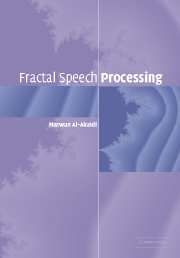Book contents
- Frontmatter
- Contents
- List of acronyms and abbreviations
- 1 Introduction to speech processing
- 2 Computational background
- 3 Statistical analysis, entropy and Bayesian estimation
- 4 Introduction to fractal geometry
- 5 Application to speech processing and synthesis
- 6 Speech processing with fractals
- 7 Speech synthesis using fractals
- 8 Cryptology and chaos
- Index
2 - Computational background
- Frontmatter
- Contents
- List of acronyms and abbreviations
- 1 Introduction to speech processing
- 2 Computational background
- 3 Statistical analysis, entropy and Bayesian estimation
- 4 Introduction to fractal geometry
- 5 Application to speech processing and synthesis
- 6 Speech processing with fractals
- 7 Speech synthesis using fractals
- 8 Cryptology and chaos
- Index
Summary
The computational background to digital signal processing (DSP) involves a number of techniques of numerical analysis. Those techniques which are of particular value are:
solutions to linear systems of equations
finite difference analysis
numerical integration
A large number of DSP algorithms can be written in terms of a matrix equation or a set of matrix equations. Hence, computational methods in linear algebra are an important aspect of the subject. Many DSP algorithms can be classified in terms of a digital filter. Two important classes of digital filter are used in DSP, as follows.
Convolution filters are nonrecursive filters. They use linear processes that operate on the data directly.
Fourier filters operate on data obtained by computing the discrete Fourier transform of a signal. This is accomplished using the fast Fourier transform algorithm.
Digital filters
Digital filters fall into two main categories:
real-space filters
Fourier-space filters
Real-space filters Real-space filters are based on some form of ‘moving window’ principle. A sample of data from a given element of the signal is processed giving (typically) a single output value. The window is then moved on to the next element of the signal and the process repeated. A common real-space filter is the finite impulse response (FIR) filter.
Information
- Type
- Chapter
- Information
- Fractal Speech Processing , pp. 26 - 65Publisher: Cambridge University PressPrint publication year: 2004
